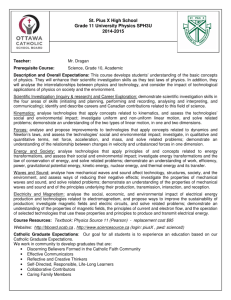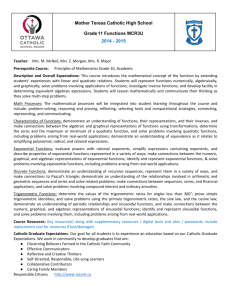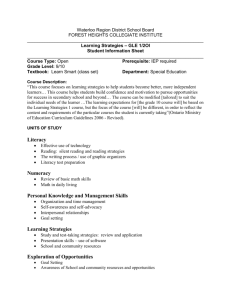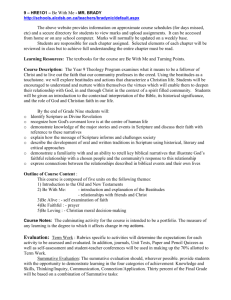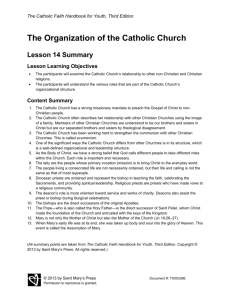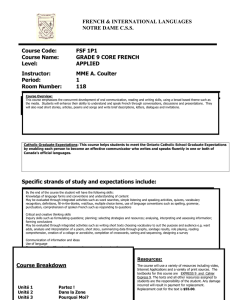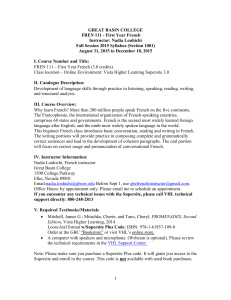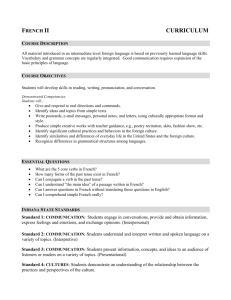Modern Languages Department HRE 2OI – Grade 10 Religion: Le
advertisement
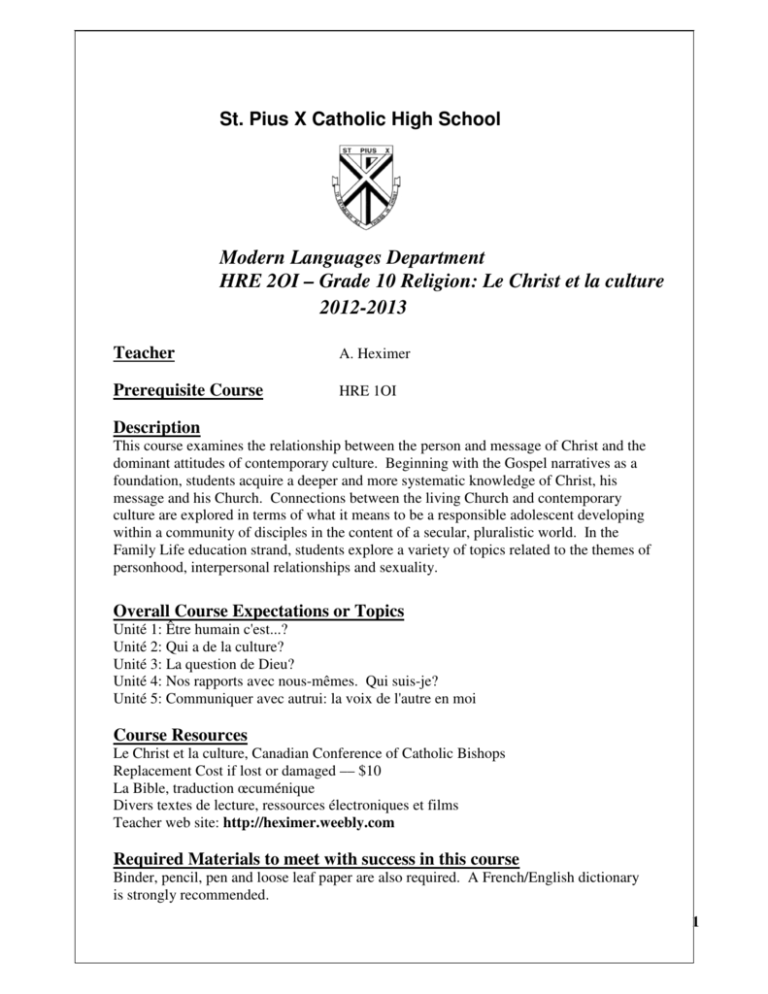
St. Pius X Catholic High School Modern Languages Department HRE 2OI – Grade 10 Religion: Le Christ et la culture 2012-2013 Teacher A. Heximer Prerequisite Course HRE 1OI Description This course examines the relationship between the person and message of Christ and the dominant attitudes of contemporary culture. Beginning with the Gospel narratives as a foundation, students acquire a deeper and more systematic knowledge of Christ, his message and his Church. Connections between the living Church and contemporary culture are explored in terms of what it means to be a responsible adolescent developing within a community of disciples in the content of a secular, pluralistic world. In the Family Life education strand, students explore a variety of topics related to the themes of personhood, interpersonal relationships and sexuality. Overall Course Expectations or Topics Unité 1: Être humain c'est...? Unité 2: Qui a de la culture? Unité 3: La question de Dieu? Unité 4: Nos rapports avec nous-mêmes. Qui suis-je? Unité 5: Communiquer avec autrui: la voix de l'autre en moi Course Resources Le Christ et la culture, Canadian Conference of Catholic Bishops Replacement Cost if lost or damaged –– $10 La Bible, traduction œcuménique Divers textes de lecture, ressources électroniques et films Teacher web site: http://heximer.weebly.com Required Materials to meet with success in this course Binder, pencil, pen and loose leaf paper are also required. A French/English dictionary is strongly recommended. 1 Report Card Grade The Report Card grade is based on evidence collected through observations, conversations, and student products (tests/exams, assignments for evaluation). Some evidence will carry greater weight than other evidence. Determining a report card grade will involve professional judgement and interpretation of evidence that reflects the student’s most consistent level of achievement, with special consideration given to more recent evidence. Mark Breakdown Term Work - 70 % Term work is based on a variety of performance tasks over the course of the term that demonstrates: knowledge, thinking, communication, and application. Summative - 30% The summative evaluation must take place completely in class and may take the form of a final exam, or a variety of summative performance tasks and/or student portfolios that demonstrate the comprehensive achievement of the overall course expectations and the four areas of the achievement chart (knowledge, thinking, communication, and application). For this course, the final 30% is assessed as follows: Summative performance task: 20% Final Exam: 10% (Please return this page) =============================================================== Student and Parent/Guardian Acknowledgement We have read the above course outline and are aware of the student responsibilities to attend class on a regular basis and to provide evidence of learning within the established timelines. Student's Name (print): _________________________________ Student's Signature _________________________________ Parent/Guardian Name (print): _________________________________ Parent/Guardian Signature: _________________________________ Parent or Student Comments or Expectations for this course (optional): 2 ** This section will be provided to staff for the first day of school. The homeroom teacher will hand out this information - it applies to all courses. The Board will provide sufficient copies for all students in the school (teachers will not need to make copies) ** Standards for all Courses Catholic Graduate Expectations Our goal for all students is that they experience an education based on the Catholic Graduate Expectations to become: A Discerning Believer Formed in the Catholic Faith Community An Effective Communicator A Reflective and Creative Thinker A Self-Directed, Responsible, Life-Long Learner A Collaborative Contributor A Caring Family Member A Responsible Citizen http://www.eoccc.org/expectations.html Assessment, Evaluation, and Reporting The primary purpose of assessment and evaluation is to improve student learning. The development of learning skills and work habits is a key indicator of future success. The following learning skills and works habits will be developed, assessed, and reported during this course: Responsibility fulfills responsibilities and commitments Organization manages time to complete tasks and achieve goals Independent work uses class time appropriately to complete tasks Collaboration works with others and promotes critical thinking Initiative demonstrates curiosity and an interest in learning Self-Regulation sets goals and monitors progress towards achievement The Achievement Chart Students will be assessed and evaluated in a balanced manner on the following four areas: 1-Knowledge and Understanding – specific content and understanding of its meaning 2-Thinking – the use of critical and creative thinking skills and/or processes 3-Communication – the ability to convey meaning through a variety of forms 4-Application – the use of knowledge and skills to make connections Students may be given multiple opportunities using a variety of assessment tasks to demonstrate their achievement of the curriculum expectations in this course. 3 Levels of Achievement The achievement chart identifies four levels of achievement: Level 1 achievement falls below the provincial standard Level 2 achievement approaches the provincial standard Level 3 achievement is at the provincial standard Level 4 achievement surpasses the provincial standard Group Work Collaboration is an important 21st Century skill. Students will take part in a variety of group work activities throughout the year. Student work within group work will be evaluated independently and each student will be assigned an individual mark. Homework Homework that is assigned is intended to assist the student in consolidating their skills and preparing for classroom instruction. Homework will be reported as part of the learning skills on the report card. Attendance In order to fully participate in this course, students must have regular attendance. Excessive absences and lates have a negative impact on student learning. Attendance will be reported as part of the learning skills on the report card. Evidence for Evaluation Evidence of student achievement for evaluation is collected over time from three different sources –observations, conversations, and student products. “Student products” may be in the form of tests or exams and/or assignments for evaluation. Students are responsible for providing evidence of their learning within given timelines. Students will be assigned consequences for cheating, plagiarism, and not completing work. A number of strategies will be attempted to ensure that all work is submitted on time. Loss of school privileges may be a consequence for not meeting academic responsibilities. Deducting marks for late assignments may occur if the student does not submit materials despite being provided alternative opportunities for work completion. Awarding of Course Credit Students who earn a mark of 50% or greater will earn one credit for the course with the following exceptions: Students who do not provide sufficient evidence of achievement of course expectations will not earn their credit regardless of their mark. Students who do not complete their summative evaluation (exam and/or end of year performance task) will not earn their credit regardless of their mark. 4
